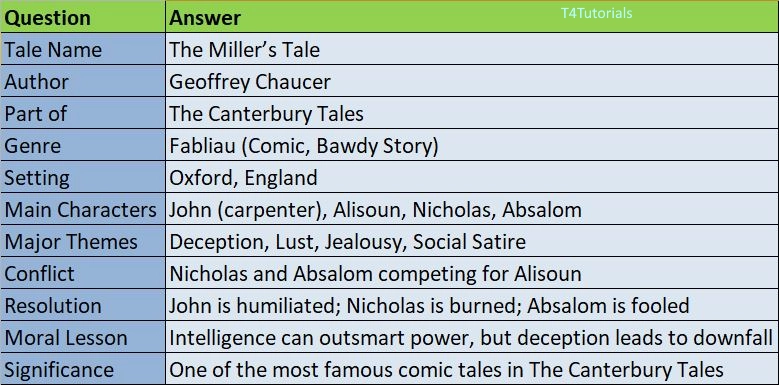Summary:
“The Miller’s Tale” is one of the most famous and humorous stories in The Canterbury Tales by Geoffrey Chaucer. It is a fabliau, a type of comic and often bawdy tale common in medieval literature. The story is a response to the noble and romantic Knight’s Tale, as the drunken Miller insists on telling a more crude and satirical story about love, deception, and foolishness.
The tale follows an old carpenter named John, who is married to a much younger and beautiful woman, Alisoun. A young scholar, Nicholas, who rents a room in John’s house, falls in love with Alisoun and convinces her to have an affair. Meanwhile, a parish clerk named Absalom also desires Alisoun and tries to woo her. Nicholas tricks John into believing that a great flood is coming, convincing him to sleep in a tub hanging from the ceiling as a form of “Noah’s Ark.” While John is distracted, Nicholas and Alisoun spend the night together.
Later, Absalom tries to steal a kiss from Alisoun at her window, but instead, she plays a prank on him by making him kiss her bare bottom. Enraged, Absalom returns with a hot poker and attempts to take revenge. This time, Nicholas sticks out his rear, and Absalom burns him with the poker. In pain, Nicholas screams for water, waking John, who crashes to the ground. The townspeople laugh at John, believing him to be mad.
The tale is a satire of courtly love and social status, emphasizing trickery, lust, and the foolishness of jealousy.

Score: 0
Attempted: 0/10
Subscribe
| Question | Answer |
| Tale Name | The Miller’s Tale |
| Author | Geoffrey Chaucer |
| Part of | The Canterbury Tales |
| Genre | Fabliau (Comic, Bawdy Story) |
| Setting | Oxford, England |
| Main Characters | John (carpenter), Alisoun, Nicholas, Absalom |
| Major Themes | Deception, Lust, Jealousy, Social Satire |
| Conflict | Nicholas and Absalom competing for Alisoun |
| Resolution | John is humiliated; Nicholas is burned; Absalom is fooled |
| Moral Lesson | Intelligence can outsmart power, but deception leads to downfall |
| Significance | One of the most famous comic tales in The Canterbury Tales |